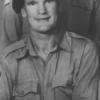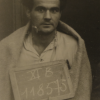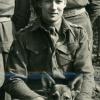On 2 June, when Gale visited the 9th Parachute Battalion at RAF Broadwell, he received an enthusiastic reception and said of Normandy, "The Hun thinks only a bloody fool will go there. That's why I'm going!"
"My glider was to be flown by Major Griffiths who, expert glider pilot though he is, will be known probably more as a great cricketer and wicket keeper than as a glider pilot. We went aboard the glider and went all through our "ditching drill", just in case. My tug aircraft was to be piloted by Wing Commander, now Group Captain, MacNamara and was to be an Albermarle aircraft. MacNamara and I had a lot in common, not only our interest in airborne matters, but our love of sailing; for he like myself was a keen yachtsman... Among others who came down to see us was Wing Commander Dennis Wheatley, who was at that time employed in the War Cabinet Offices. He brought with him a bottle of the most delicious hock I ever remembered tasting, and in this he drank to our health and our success. I am by nature superstitious. I was, therefore, very touched when as a token or talisman of good fortune he gave me a small crusader sword; this I believe he had had for years."
"My glider number was 70. I was accompanied by my ADC, Tom Haughton, David Baird my GSO 2, my personal escort, my signaller and my driver, and Rifleman Grey, Tom's batman. In the glider also were my jeep with wireless set and two motor cycles. There were twelve of us in all. Before us lay an hour and a half's flight... During the few days I had been on the station I had got to know the station commander and his staff very well. I remember I had once said that I like treacle very much indeed. It was a thoughtful, friendly, and very charming gesture, therefore, when Group Captain Surplice handed me a tin of treacle to take to France as I was emplaning."
"In the glider we all wore Mae Wests, and taking our places we all fastened ourselves in and waited for the jerk as the tug took the strain on the tow-rope. Soon it came and we could feel ourselves hurtling down the smooth tarmac. Then we were airborne and once again we heard the familiar whistle as the air rushed by and we glided higher and higher into the dark night. I suppose all men have different reactions on these occasions. I went to sleep and slept soundly for the best part of an hour. I was woken up by a considerable bumping. We had run into a small local storm in the Channel Griffiths was having a ticklish time and the glider was all over the place."
"We were flying at about five thousand feet and we soon knew the coast was under us, for we were met by a stream of flak. It was weird to see this roaring up in great golden chains past the windows of the glider, some of it being apparently between us and the tug aircraft... I shall never forget the sound as we rushed down in our final steep dive, then we suddenly flattened out, and soon with a bump, bump, bump, we landed on an extremely rough stubble field. Over the field we sped and then with a bang we hit a low embankment. The forward undercarriage wheel stove up through the floor, the glider spun round on its nose in a small circle and, as one wing hit one of those infernal stakes, we drew up to a standstill. We opened the door. Outside all was quiet... About us now the other gliders were coming in, crashing and screeching as they applied their brakes. It was a glorious moment."
"Had Ranville been cleared of the enemy? Were the bridges taken, were they intact and safely in our hands? How was Terence Otway and his gallant battalion faring at the Merville battery? We could still hear intermittent fire from the direction of the bridges... The crash we had, though not serious, resulted in the nose being really well dug into the ground and the problem of getting the jeep out was defeating us. Eventually we had to give it up: and so on foot we set out for Ranville. Soon dawn commenced to break, just a few yellow streaks towards the East... A figure loomed up before me that I would always recognise anywhere. It was Nigel Poett. He had successfully captured the bridges."
"It was just before it was getting light that we heard sounds from the side of the road, difficult at first to interpret. We stopped and we listened. Was it a party of Germans? We kept still and waited. I don't know whether we were relieved, disappointed or merely amused when we discovered it was only a horse grazing as unconcerned with the great adventure being enacted around it as it could be. I took the toggle rope from around my waist and, using it as a halter, took the horse along with me. I wasn't quite sure what I was going to do with it, but it made the men laugh and it amused me. The next day the poor brute was killed by a German mortar bomb and we buried it in the grounds of the chateau."
"It was daylight by the time we reached Ranville and knocked on the front door of the chateau. The poor people inside had not the remotest idea what it was all about... They were very frightened, these people, but very kind. They did not know at the time whether this was just a raid or the real and long waited for invasion. Would we just come and then go; then, when the Germans returned, would they have to pay the price of sheltering us? Whatever their thoughts they never faltered. The people of Normandy are a great, stalwart people; not effusive, but loyal and true to the bone."
During the day, Major-General Gale toured the positions in the Ranville area. Staff-Sergeant Ernie Stocker, a Glider Pilot, recalls the sight of the General approaching: "Some time later in the day, walking along the road which was some ten feet elevated and right on the skyline, came this six-foot four-inch tall man, with no helmet on and a shock of white hair. Walking with him was his corporal bodyguard with a Sten and that's all! It was General Gale - known of course, right from his schooldays at Rossall, as 'Windy'. He looked fearless while we were cringing! He said "Where are the enemy?" to me. It should be remembered that the whole situation was fluid and firing was taking place in all different directions, so I said "I don't know, Sir." He said "Come on, Corporal. Let's find somebody who does know something about this bloody war!" It's little wonder that he figures so high on Rossall's honours board!"
At about 09:00 on the 6th June, a rather peculiar sight was seen strolling calmly to Bénouville Bridge from the direction of Ranville. It was Major-General Gale, with Brigadiers Poett and Kindersley, all wearing their red berets and none of them paying the slightest bit of attention to the shots that were passing around them. After exchanging a few words of encouragement with the men that they passed, they continued on to 7th Battalion HQ, where they were briefed on the current situation by Lieutenant-Colonel Pine-Coffin.
Gale continues: "Up to this time {6th June} I had no artillery of my own and no artillery support from the sea assault division, who were quite busy enough fighting their own battle in the area of the beaches and the ground just inland. In the extreme North I had a call on naval gunfire, but this would not reach much beyond Le Plein. It would, I knew, be several hours before I could expect to get any artillery support from West of the Orne and, at the rate things seemed to be going, that certainly not before the morrow. My only reserve was in Ranville: it consisted of about sixty men of the Independent Parachute Company... To summarize; we were very thin on the ground, but we had done what we set out to do and we all believed that we could hold what we had gained."
"The closing incident for this great day was the fly-in of the 6th Airlanding Brigade. It was a sight I shall never forget. Of a sudden the dull roar of aircraft could be heard. Then they came, hundreds of aircraft and gliders: the sky was filled with them. We could see the tug aircraft cast off their gliders, and down in great spirals the latter came to the landing zone. Most of the stakes had by now been cleared... It is impossible to say with what relief we watched this reinforcement arrive. The German reaction was quick. He mortared our headquarters, the village of Ranville, and attempted to mortar the landing zone. His fire was inaccurate and ineffectual. Unfortunately at my headquarters poor Jack Norris, my Artillery Commander, received a terrible throat wound; none of us thought that he could possibly survive, but he did. His loss to us out there was great. Jerry Lacoste, my Intelligence Officer, was also hit. One of my provost men standing just behind me was killed."





Latest Comments
There are currently no comments for this content.
Add Comment
In order to add comments you must be registered with ParaData.
If you are currently a ParaData member please login.
If you are not currently a ParaData member but wish to get involved please register.